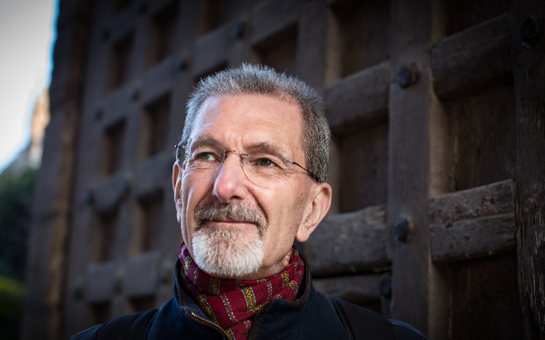- Alec Roth
Honig aller Wesen (2023)
(Honey of all Beings.)- Peters Edition Limited (World)
Commissioned by the RIAS Kammerchor, Berlin in celebration of the 75th anniversary of its foundation in 1948.
Programme Note
My source for the text is the Brihadaranyaka Upanishad, a philosophical/mystcal work, written in Sanskrit and dating from around the 7th century BCE. Chapter 2 contains the Madhu Khanda (honeywisdom). Honey is used here as a metaphor for a good/beneficial outcome.
The essence of the teaching is that inorganic nature and organic beings (plants, animals, humans) are intimately linked. All things and all beings are inter-dependent and are the ‘honey’ of each other, and bound together in a great unity. Another metaphor is used to illustrate this: All points on the rim of a wheel are connected to the hub, and from there to each other by the spokes.
The inter-connectedness of all is an old idea, but in recent years scientists have begun to embrace such thinking from the Environmental Movement: ideas such as the Gaia Hypothesis of James Lovelock; the new discipline of “Earth Sciences” etc. So many forces in the modern world seem intent on dividing us one from other; this unifying approach has new importance.
But music is not a good medium for presenting complex concepts or philosophy, so I have only used a small part of the Madhu Khanda text to represent its basic ideas. Instead, the music explores these ideas wordlessly in a set of choral dances. For me, the unaccompanied choir is itself a most wonderful metaphor. Individual human voices are connected and bound together through the unison, polyphony and harmony of music. And the music extends this connection out to the listeners, drawing them in both individually and communally with the invisible bonds of breath, heartbeat and emotion. This theme seems a good way to celebrate the 75th anniversary of one of the world’s great choirs, and my new work is dedicated to them: the RIAS Kammerchor, Berlin.
In adapting the text, I have consulted eight translations of the Brihadaranyaka Upanishad. I am particularly indebted to the first translation in any European language, that by Max Müller in English (1884). His opening sentence is so beautifully structured and elegant. The first time I read it, music came into my head. Max Müller was a brilliant linguist, but there are poetic and musical qualities in his writing, which I like to think were inherited from his father Wilhelm, the librettist of Schubert’s great song-cycles. I have taken the liberty of including in my work a passing reference to that composer’s honeyed music.
I set myself the difficult task of composing a work which can be sung either in English or in German. Not being a native speaker, I should like to express my gratitude to Clemens Hägele and Lukas Lomtscher for their corrections and improvements to my first drafts of the German text. My thanks are also due to Justin Doyle and the RIAS Kammerchor singers and staff for their warm welcome and untiring support. And last but not least, thanks to you, the audience. I’m a composer, but I only write the recipe; it’s the musicians who cook the dish and serve it up for you. Thank you for coming.
Guten Appetit! Zum Wohl!
Alec Roth, February 2024
More Info

- Alec Roth choral premieres in Berlin
- 20th February 2024
- Alec Roth choral premieres for the 75th anniversary of the RIAS Kammerchor, Berlin as Composer in Residence.

 Located in the UK
Located in the UK
 Located in the USA
Located in the USA
 Located in Europe
Located in Europe